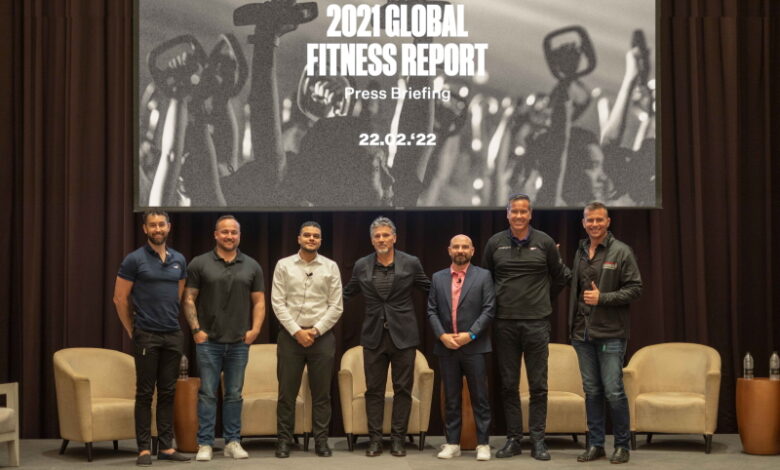
- 12,517 consumers across 14 countries participated in the survey
- Findings reveal an 88% recovery in gym memberships in the Middle East in the last year, where 67% of gym-goers select memberships depending on the instructors
- 79% in the Middle East prefer group workouts while 66% of gym-goers prefer branded fitness classes
The global leader in group fitness has revealed the results of their Global Fitness Survey today. The Les Mills 2021 Global Fitness Survey features insights from 12,157 consumers across 14 countries and explores how the pandemic has changed our fitness habits and spotlights the trends that will shape our workouts in the years to follow.
According to the Global Consumer Fitness report the gyms around the world are seeing a massive recovery as we emerge from the pandemic in 2021 and 2022, with fitness fans anxious to get back to live fitness workouts. Additionally, in the Middle East gyms are on a strong path towards recovery, with class occupancy catching up at 88% pre-COVID levels. And other global markets are up by 120% of pre-COVID membership levels where capacity restrictions have lifted.

Furthermore, after months of isolation and a year of enforced home workouts, the appetite for live fitness experiences in groups is soaring, with 85% of gymgoers interested in trying live classes in their facility. Two-thirds of global gym members (67%) prefer working out with others in small or large groups, whereas this number is even higher in The Middle East with 79%, while live classes in clubs are nearly twice as appealing as online classes that are live streamed (done by 44% of members vs 23%).
These findings were revealed at a panel discussion hosted by Les Mills on the 22nd February 2022 in Dubai. The event featured an esteemed line up of fitness and hospitality experts who gathered to discuss the latest fitness trends and the future of the global fitness community.
“After months of being stuck at home, people can’t wait to get back to fitness facilities and enjoy their favorite workouts. Many people have missed the thrill of a busy class and the extra motivation you get from working out with others while being led by a trained Instructor. We are looking forward to adapting to the gradual changes in the coming years”, said Glen Stollery, CEO, Les Mills International – India, Middle East and Africa.
The pandemic has encouraged consumers to prioritise their health, with 50% focusing more on their wellbeing in 2021. 82% of consumers regularly exercise, while 75% of this group indulge in gym-type activities, making fitness the world’s biggest sport.
In a world awash with technology, people have never played a more integral role in shaping the member experience. Thus, the quality of Instructors is identified as the single most important factor for gymgoers when choosing a live class, favored by 28%, ahead of the quality of music (24%) and type of class (21%). Quality Instructors are cited as a key component of the live revival, meeting strong consumer demand for added motivation and deeper interactions. This percentage is 5 times higher in the Middle East with 67% of gym-goers saying Instructors are a significant factor in choosing a gym to join.
The impact of the Covid-19 pandemic on the fitness landscape is evident throughout the report. The digital fitness boom looks set to last, with 80% of gym members planning to continue using digital workouts post-pandemic.
‘Omnichannel Fitness’ – a blend of in-gym and digital home workouts – is tipped to gain traction as we emerge from the pandemic, with most exercisers (59%) favoring a 60:40 split between gym and home workouts. Clubs that can bridge that gap between the digital and physical world to offer members an omnichannel fitness experience will be best placed to thrive across all domains.
Though live fitness experiences remain at the pinnacle, the digital fitness boom and the growth of home working mean today’s fitness consumers demand a connected fitness experience which offers convenience and enables them to maintain a more active lifestyle.
Lockdown has also created a new generation of fitness fans who have taken tentative steps into fitness and are now deciding next steps, with 27% of regular fitness enthusiasts describing themselves as ‘absolute beginners’.
Taking top spot in this Global survey is HIIT – that remains hugely popular, particularly among the key Millennial and Gen Z – and it’s great for operators too. The report finds that 82% of consumers now regularly exercise (or soon plan to), while 75% of this group do gym-type activities, making fitness the world’s biggest sport. HIIT is favored by 32% of participants, closely followed by Indoor Cycling (30%) and Dance classes (29%).
But it’s not just HIIT-heads who are loyal, 58% of members say they would likely cancel their membership if their gym took away their favorite class. Participants are also highly discerning, with 86% choosing to do branded classes, and 62% stating the presence of quality elements are key to deciding which classes they attend. This number is high in the Middle East, where 66% of gym-goers are more likely to go off for branded class.
The survey also shows that out of-all the recent shifts in workplace culture, the need for every employer to consider a wellness plan for their teams is priority. Around 44% of employers are now including wellness offerings as part of their employment package. Employees – particularly Millennials and Gen-Z – are seeking companies who take notice of these trends and actively support the wellbeing of their people.
Data also suggests that people who have access to fitness via their employer work out 43% more than those who don’t, of which 35% of global exercisers and 40% of the Middle East exercisers work out to reduce stress.
“Here at Les Mills, we believe in the power of sharing to grow the fitness industry’s footprint. All the figures within this report are drawn from the Les Mills Global Consumer Fitness Survey and our own Les Mills club data”, said Glen Stollery, CEO, Les Mills International – India, Middle East and Africa.





